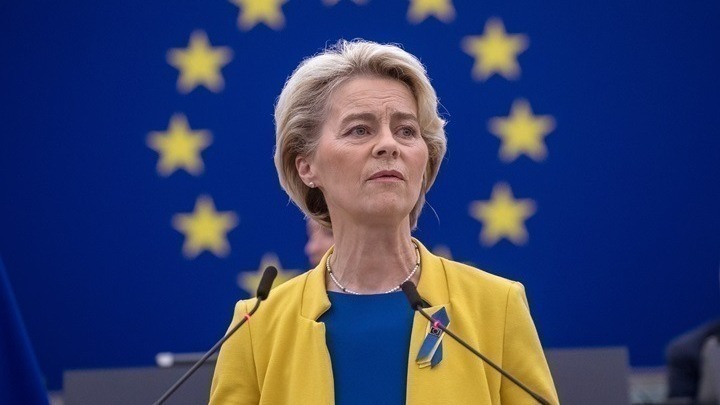The President of the European Commission sent a letter to the leaders of the EU member states regarding migration, ahead of the Summit on Thursday, October 23, in Brussels.
The letter outlines a comprehensive approach to managing migration with the completion of the legal framework in the coming months.
As emphasized in her letter, the head of the Commission states that illegal trafficking of migrants remains a serious concern, which is why measures must “be stronger and enhance law enforcement and border management capabilities.” This, as she explains, will be achieved through the proposal to strengthen police cooperation, which she welcomed, as well as the enhancement of Europol. She urges the European Parliament and the Council to make progress on the proposed directive that will improve the legal framework.
At the same time, she proposes cooperation with digital platforms and technology providers, aiming to end the dissemination of such information, namely the online organization and advertising of smuggling activities.
Furthermore, in her proposals, the President of the Commission sets the parameter of coordinated cooperation within the framework of the Common Foreign and Security Policy, for the establishment of a sanctions system against migrant smuggling networks and human traffickers in the EU, and presents proposals such as asset freezing. “We are committed to supporting member states in combating state-funded smuggling and addressing hybrid threats, among other things by enhancing border control capabilities and aerial surveillance systems,” she emphasizes in her letter.
The migration flows
According to the data in the letter, Libya remains the most significant country of departure on the Central Mediterranean routes. Flows on the Central Mediterranean route remain stable, with some fluctuations of about 3% increase. As Ms. von der Leyen pointed out, cooperation in the region continues at a technical level with the relevant authorities in the west and east of the country, revealing that “the technical mission of last week paves the way for further operational cooperation” in combating illegal migrant trafficking and ensuring protection and voluntary returns from Libya to the countries of origin.
As mentioned in the letter, the transfer from African countries to countries of origin has increased through EU-funded operations with over 22 thousand returns so far. In 2025, the International Organization for Migration facilitated the voluntary return of over 7 thousand migrants from Tunisia to their countries of origin. Additionally, a EU-Tunisia Association Council is scheduled to take place on October 28 in Brussels. Work is progressing on the implementation of the Strategy and Comprehensive Partnership with Egypt, with the EU-Egypt Summit taking place on October 22. Cooperation with Morocco is also under discussion, to enhance legal migration and combat the smuggling of migrants and support returns.
The letter emphasizes that the EU is moving towards a new partnership with Mauritania, while negotiations for cooperation arrangements between Frontex and the border management authorities of Senegal are ongoing. The data provided shows that the Western Balkans route recorded a 90% decrease in illegal border crossings in the last year and a 47% decrease over the last three years. She also points out that “commitment with Turkey is being strengthened through the High-Level Dialogue, supporting the full and effective implementation of the EU-Turkey statement and the EU-Turkey readmission agreement to all member states. In recent years, approximately 393 million euros have been invested to support Turkey’s efforts to enhance border management at its eastern and southeastern borders. We are also increasingly participating in combating smuggling, among other things through cooperation between Turkey, Europol, and Frontex.” For the support of Syria and the implementation of the first cross-border program worth 80 million euros, sustainable solutions for Syrian refugees in Lebanon will be supported, including facilitating safe, voluntary, and dignified returns. “Similarly, we are working with Turkish authorities to facilitate voluntary returns. Since June, the Frontex European Reintegration Program has also been available for Syria. While the committee is working to ensure coordination at the EU level regarding the situation of Afghans,” she added.
The next steps
There is a need for a strong legal framework that will be applied evenly across the EU. In view of the implementation of the Pact on Migration and Asylum starting in June 2026, the first cycle of migration management will soon begin, “providing effective support to member states under pressure and implementing the solidarity mechanism must go hand in hand with measures related to responsibility. This symmetry is critical for the success of the Pact. We continue our legislative work to complete the Pact. The proposal for a common European return system places great emphasis on more effective and simplified procedures, including the recognition of return decisions across the EU, provides stricter rules for managing cases of evasion and security, and also provides a legal basis for the potential use of return hubs,” emphasizes the President of the European Commission.
As Ms. von der Leyen emphasizes to the leaders, “we must move quickly and decisively to reach an agreement that will deliver tangible results, allowing us to improve our capabilities in ensuring the rapid, effective, and dignified return of those who do not have the right to stay in the EU, in accordance with our values and international law.” Furthermore, she states that “progress in revising the concept of safe third countries and the Union list of safe countries of origin will help reduce the overall pressure on our asylum systems and complement the functioning of the Pact on Migration and Asylum.”
She highlights the importance of the recently presented Pact for the Mediterranean, as well as the strategic partnerships that have begun with Tunisia, Egypt, and Jordan in areas related to border management. As she stated, a package of 675 million euros for the period 2025-2027 will soon be approved for the prevention of illegal migration, combating smuggling, and providing services for vulnerable migrants in North Africa and effective migration management in Egypt, Libya, Morocco, and Algeria. (21/10/25)
 go to the original language article
go to the original language article
